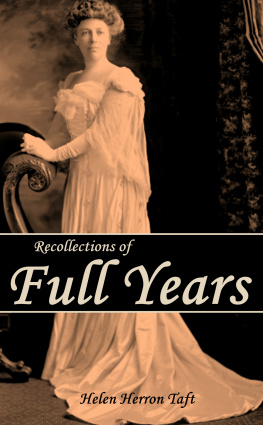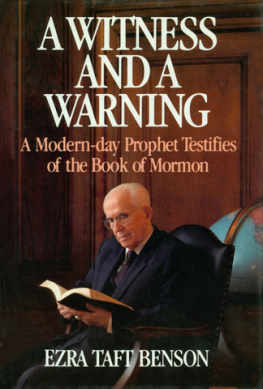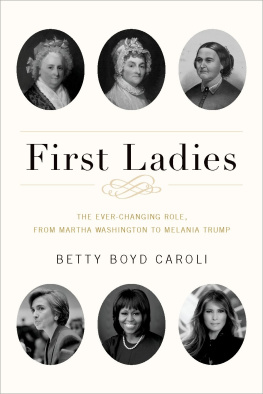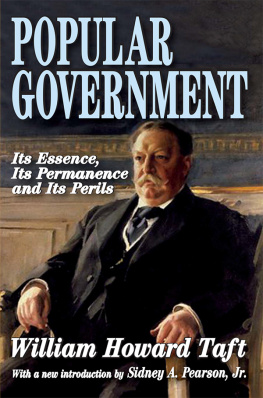
RECOLLECTIONS
OF FULL YEARS
BY
MRS. WILLIAM HOWARD TAFT
1914
COPYRIGHT 2014 BIG BYTE BOOKS
Get more great reading from BIG BYTE BOOKS
ACKNOWLEDGEMENTS
I wish to express my grateful acknowledgment to Eleanor Franklin Egan and my daughter for their valued assistance in the preparation for publication of these Recollections.
HELEN HERRON TAFT.
2014 PREFACE
Written at the immediate end of William Howard Tafts only term as president, this memoir by Nellie Taft is rather remarkable for its scope and its personal nature. She writes with a warm, disarming style of her youthful years, her marriage, and Will Tafts rapid rise in public life.
A particular focus of the book concerns their travels and their time in the Philippines. Nellie Taft seems to have had a talent for cross-cultural friendship and clearly a tremendous curiosity about the world. She writes with intelligence and humor, revealing indirectly to the reader why she was so important to Will Tafts success. In the White House, Nellie was not stuffy and served alcohol to guests at a time when prohibition was being sought.
After the presidency, Taft was a law professor and then became the only president to serve as Chief Justice of the Supreme Court. He eventually had to step down due to health problems and he died in 1930. Nellie Taft survived him by 13 years, dying on May 22, 1943. She is buried next to her husband, one of only two presidents buried at Arlington National Cemetery (the other being John F. Kennedy, beside whom is buried Jacqueline Bouvier Kennedy Onassis).
INTRODUCTION
CINCINNATI, the city of my birth and early memories, was, in the sixties, about as begrimed and noisy and altogether unattractive as any place well could be; yet it possessed certain attributes which really entitled it to the proud designation of The Queen City of the West.
It was prosperous; it had hardly yet been surpassed in prosperity by Chicago; Cleveland was not even spoken of as a rival; and in many ways it was the most important centre west of New York and east of the Mississippi.
It owed its early development principally to its advantageous location. It lay on the great central route from the East to the West, which runs from Baltimore and Washington to Cumberland and over the Alleghenies to Pittsburg, thence by the Ohio River to Cincinnati and on west to St. Louis and south to New Orleans. It had an important trade with New Orleans and drew commerce from a large territory to the north. But whatever else may be said of it, its most devoted citizen could not claim that Cincinnati was beautiful. Its buildings were unlovely; its streets were badly paved and as badly kept; and it lay under a pall of soft coal smoke which left its sooty mark upon every-thinginhabitants included.
Yet, ugly as it was, the city boasted an unusual society. During the first half of the nineteenth century many young men of good stock and great ability, drawn by the promise of rapid advancement, had moved to Cincinnati from all parts of the East and South; New Jersey, New England, Virginia and Kentucky contributing, perhaps, the greatest number. There were many families of wealth and culture which, without parade or display, maintained fine homes and dispensed a generous hospitality. The suburbs, East Walnut Hills, Mt. Auburn and Clifton, on the heights to the north and east, were famous for their beautiful country places.
Then there was a large population of the best class of Germans, many of whom were university men who left their own country after the Revolution of 1848 and came to Cincinnati to settle. Of these, Frederick Hassaurek, General Willich and Judge Stallo, who came to Cincinnati when Carl Schurz went to St. Louis, are perhaps the most prominent. The German influence upon the community was marked. It made for a more liberal Sunday; it brought the study of German into the public schools; and it developed a strong taste for good music. Indeed, the musical advantages of Cincinnati in my girlhood were better than those of any city in the United States, with the exception of New York or Boston. Theodore Thomas was president of the Conservatory of Music and he organised a symphony orchestra which he continued to direct until he went to Chicago along about 1890.
Cincinnati in those days, with her educated, wealthy and public-spirited society, was much in advance of any other city in the Mississippi Valley in culture and refinement. There was great interest in schools of all sorts and in every kind of intellectual activity. Away back in 1848 the Literary Club of Cincinnati was formed by a company of men among whom were both Mr. Taft's father and mine, as well as Rutherford B. Hayes [future Civil War veteran and 19 th President of the United States], Stanley Matthews, Manning F. Force and Mr. Spofford, later Librarian of Congress. This club continues to be a cherished institution and in my girlhood it was the centre of all interest in literature and intellectual pursuits.
My father, John Williamson Herron, was a graduate of Miami University at Oxford, Ohio, and was in college with Benjamin Harrison. He was for fifty years a trustee of that institution and was devoted to its interests. My husband's father, Judge Alphonse Taft, was one of the Yale class of 1833, was for many years a member of the Yale Corporation, and had five sons who graduated at that university. My mother's brother, Judge Isaac Clinton Collins, and one of my two brothers also graduated at Yale, while my other brother graduated at Harvard, so it will be seen that both my husband and I grew up in the midst of strong collegiate traditions.
To write about one's childhood is not easy. Memories by the score come flocking up, but, dear as they are, upon examination they turn out to be quite commonplace and hardly worth relating. My memories are not sufficiently early to have any special value. The first thing that I dimly remember is sitting on the front steps of my home watching some sort of parade in which there were many soldiers, but I was too young then to know that it was a peace celebration I was witnessing at the close of the Civil War.
My father was a lawyer who came to the bar of Ohio in the 'forties. He was United States Attorney under President Harrison, was a State Senator, and twice declined appointments to the Bench because the salary attached to these positions was not enough to support his large family. I was the fourth in a family of eleven, eight girls and three boys. One boy and two girls died before I can remember.
Our house was one of a block of grey brick houses in Pike Street, at the east end of Cincinnati, which, at that time, was the fashionable residence section of the city. Pike Street runs down to the river on a rather steep incline and, as it was paved with cobblestones, my early memories are somewhat marred by an impression of the frequent clatter and clang of heavy wagons pulling their way up the hill from the river landing.
While our house was not particularly distinguished, being much like those on either side of it, across the street from us there were two very striking and imposing residences which lent distinction to the neighbourhood, and in which, as I grew up, were formed the pleasantest associations of my life. The one directly opposite was a large, square, red brick house which had an air of great dignity. It was the home of Mr. Larz Anderson. There were ten boys in the Anderson family and, though they were all much older than I and most of them had gone away before I grew up, I remember that it was a very lively household always. In my later girlhood we were specially linked to this family by the marriage of one of the boys, Charles, to my sister Jennie.
Next page






